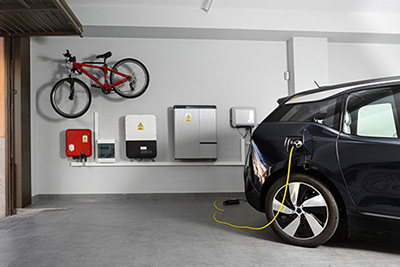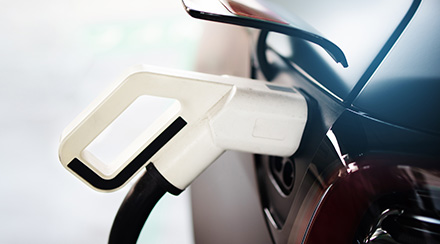What Are the Hidden Costs of Owning an Electric Car?
Many drivers who switch from gasoline-powered cars to electric vehicles are drawn in by the appeal of never paying for gas again. And while you can save money by switching to an electric car, the savings are a little more complicated than that. Electric cars offer more than one way to save, but those savings are offset by additional costs, some of which might not be so obvious.
Besides the purchase price, there are a handful of extra costs that you should factor into your decision to switch to an electric car.

Electricity Costs
Gas savings is one of the many benefits of an EV or hybrid, but some of that savings is offset by the additional costs on your electricity bill from charging your car. Fortunately, that savings often wins out over the added electricity costs, but your electric rate and where you might charge your car in public is still worth considering.
Installing a Faster Charging Station
To charge an electric car, you’ll need to plug it in while it’s not in use. There are three different charging speeds, and the slowest one – called level one charging – requires no special equipment. You can plug an electric vehicle into any grounded 120-volt outlet for level one charging, but the downside is that it can take up to 50 hours to fully charge a depleted battery this way.
This is intolerably slow for most drivers who have a daily commute, so it’s common for electric car owners to install level two charging stations in their garages. A level two charging station is powered by 240 volts and can fully recharge a depleted battery in four to ten hours.
A 240-volt charging station should always be installed by a licensed electrician, and the costs can vary quite a bit. The cost of the charging equipment varies from about $400 to $700, but the cost of labor and additional services can vary much more, up to around $3,000. Depending on the existing electrical infrastructure in your home, this may include upgrading the wiring in your garage and/or your main electrical panel.
Because of these variables, it’s a good idea to request several price quotes from reputable electricians in your area. This may include a home inspection to determine the need for other upgrades – and if you have any doubt about the condition of your wiring or electrical panel, requesting a home inspection may help you avoid any unpleasant surprises when installation day arrives.
Public Charging Fees
Even if you do most of your electric car charging at home, chances are you’ll occasionally need to top off your battery at a public charging station. The good news is that level two charging is standard at public charging stations, and some stations offer level three charging, which can charge a depleted battery to 80 percent in about 20 to 60 minutes.
The bad news is that there’s a cost to that convenience. Level two chargers typically charge per minute or per kilowatt-hour. Level three charging tends to be even more expensive. Compared to residential electricity rates that are usually between 10 and 15 cents per kWh in most places, the cost of public charging can really add up if your commute is dependent on it.
When planning long-distance travel that will require you to stop at one or more public charging stations, it can be helpful to identify several charging stations along your route. There is an interactive map of charging stations throughout the U.S. on the Department of Energy website, and you can call the stations along your route to inquire about their rates, restrictions and charging speeds.
Special Maintenance
In general, electric vehicles require far less maintenance than their gas-powered counterparts (more on this below). But electric cars aren’t maintenance-free, and there are a few routine maintenance steps that are exclusive to electric vehicles. One example is a full flush and fluid replacement of the coolant circuits, which many electric car manufacturers recommend every five years, regardless of mileage.
If you’re shopping for an electric car, you can look on each manufacturer’s website or just call the dealerships to inquire about special maintenance steps and the cost to have these services performed by dealership mechanics.
Auto Insurance
Before purchasing any new electric car, it’s a good idea to get a quote from your insurance carrier to see how the upgrade will affect your insurance rate. And if you’re switching from gas to electric, there’s a good chance your rate will increase.
The reason for the higher rate has a lot to do with the higher average purchase prices of electric cars, as well as the high cost of certain components, like batteries. But insurance rates for electric vehicles are also higher because insurance carriers have less data on which to base those rates, according to Consumer Reports. As electric cars become more common and insurers are able to collect more long-term data about them, there’s a possibility that these insurance costs could come down.

Repair Costs
While electric cars help drivers save on routine maintenance, the cost of repairs after an accident may be higher. There are a few reasons for this; according to an in-depth study by analytical firm We Predict, mechanics tend to log more labor hours and charge higher labor rates for electric vehicles than gas-powered vehicles. This is partially due to how new and unfamiliar electric cars are to some repair professionals, and because electric car repair can require additional training and certifications. So as electric vehicles become more common and familiar to mechanics, the labor costs may also start to decrease.
The Cost of an Electric Car Battery
Another factor to consider is the price of electric car parts, specifically the battery, as the cost of an electric car battery varies from a few thousand dollars to nearly $20,000. If an electric car battery needs to be replaced after an accident, there may be an increased chance of the car being considered “totaled” by an insurance company due to the high cost. When shopping for an electric car, it’s wise to ask the dealership about battery warranties and available service options in the event battery replacement is required.
Time Cost
They say time is money, so it’s worth mentioning again: recharging an electric car takes longer than refilling a gas tank. If your electric car’s battery capacity is large enough to get you through the day and you have a level two charging station at home, this may not be an issue at all. You may even save time because you’re saving trips to the gas station. But if you decide to take a road trip, you’ll need to recharge on the go – and that means taking a lengthy pit stop. Even if you find a level three charger, you’ll be “refueling” for several minutes longer than you’d spend at the gasoline pump. Since EV chargers aren't as widely available as gas stations, you may also have to wait in line for your turn to charge up.
What About Savings?
While there are quite a few hidden costs to owning an electric car, many drivers save money in the long run. And the reasons why are pretty straightforward:
- Fuel savings. The price of gas and electricity both vary by location, but even in places where electricity tends to be expensive, recharging an electric car tends to be cheaper than refueling a gas-powered one. According to EnergySage, an energy information portal and marketplace funded by the U.S. Department of Energy, charging an EV at home is approximately 3.5 times cheaper per mile than gasoline. Their analysis found that a home-charged electric compact sedan costs about four cents per mile on average, compared to 14 cents per mile with a comparable gas-powered car.
- Maintenance savings. As mentioned above, there are several routine maintenance tasks that don’t apply to electric cars – oil changes, transmission work, spark plug changes, belt replacement and more. There’s no fuel system, so you’ll never need to flush the tank, clean the fuel injectors or replace the fuel pump. If you simply maintain your tires, wiper blades, brakes and cabin air filter, you’re well on your way to an impeccably maintained electric car.
- Electric vehicle tax credits. A federal electric vehicle tax credit, called the Qualified Plug-In Electric Vehicle Tax Credit, can help drivers save as much as $7,500 on the purchase of a qualifying electric car. This tax credit only applies to the first 200,000 electric cars sold in the U.S. by each manufacturer, so it’s not available for all cars. But that’s just the federal tax perk – other rebates and tax incentives vary by location. You can use the Department of Energy’s search tool to find other incentives in your area.
Despite the hidden costs, an electric car can be a smart financial investment that helps you avoid the pump and make fewer trips to the mechanic. And, of course, you’ll be making an investment in our planet by reducing your carbon footprint.
Looking for Something Specific?
Select a category to find resources for topics that interest you.
Select Category

Related Articles:

Are Electric Cars Better for the Environment?
Electric cars produce virtually zero emissions while they’re being driven, but charging car batteries and the materials used to make these batteries have their own environmental impact. See how these effects balance out.
Read Article
Are Electric Cars Worth It?
Electric cars are becoming more popular among consumers and car makers for their impressive technology and positive environmental impact. When deciding whether an electric car is right for you, consider these benefits as well as the trade-offs.
Read Article
Are Electric Cars Cheaper in the Long Run?
The popularity of electric cars is growing as manufacturers introduce affordable models that can drive farther on a single charge. While great for the environment, are they great for your wallet?
Read ArticleMost Popular Articles

Electric Vehicle Guide
Whether you're deciding if an EV is right for you or setting up a home charger, our Electric Vehicle Guide can help you wherever you are in your EV journey. Learn More.
What Are the Hidden Costs of Owning an Electric Car?
Many drivers who switch from gasoline-powered cars to electric vehicles are drawn in by the appeal of never paying for gas again. And while you can save money by switching to an electric car, the savings are a little more complicated than that. Electric cars offer more than one way to save, but those savings are offset by additional costs, some of which might not be so obvious.
Besides the purchase price, there are a handful of extra costs that you should factor into your decision to switch to an electric car.
Electricity Costs
Gas savings is one of the many benefits of an EV or hybrid, but some of that savings is offset by the additional costs on your electricity bill from charging your car. Fortunately, that savings often wins out over the added electricity costs, but your electric rate and where you might charge your car in public is still worth considering.
Installing a Faster Charging Station
To charge an electric car, you’ll need to plug it in while it’s not in use. There are three different charging speeds, and the slowest one – called level one charging – requires no special equipment. You can plug an electric vehicle into any grounded 120-volt outlet for level one charging, but the downside is that it can take up to 50 hours to fully charge a depleted battery this way.
This is intolerably slow for most drivers who have a daily commute, so it’s common for electric car owners to install level two charging stations in their garages. A level two charging station is powered by 240 volts and can fully recharge a depleted battery in four to ten hours.
A 240-volt charging station should always be installed by a licensed electrician, and the costs can vary quite a bit. The cost of the charging equipment varies from about $400 to $700, but the cost of labor and additional services can vary much more, up to around $3,000. Depending on the existing electrical infrastructure in your home, this may include upgrading the wiring in your garage and/or your main electrical panel.
Because of these variables, it’s a good idea to request several price quotes from reputable electricians in your area. This may include a home inspection to determine the need for other upgrades – and if you have any doubt about the condition of your wiring or electrical panel, requesting a home inspection may help you avoid any unpleasant surprises when installation day arrives.
Public Charging Fees
Even if you do most of your electric car charging at home, chances are you’ll occasionally need to top off your battery at a public charging station. The good news is that level two charging is standard at public charging stations, and some stations offer level three charging, which can charge a depleted battery to 80 percent in about 20 to 60 minutes.
The bad news is that there’s a cost to that convenience. Level two chargers typically charge per minute or per kilowatt-hour. Level three charging tends to be even more expensive. Compared to residential electricity rates that are usually between 10 and 15 cents per kWh in most places, the cost of public charging can really add up if your commute is dependent on it.
When planning long-distance travel that will require you to stop at one or more public charging stations, it can be helpful to identify several charging stations along your route. There is an interactive map of charging stations throughout the U.S. on the Department of Energy website, and you can call the stations along your route to inquire about their rates, restrictions and charging speeds.
Special Maintenance
In general, electric vehicles require far less maintenance than their gas-powered counterparts (more on this below). But electric cars aren’t maintenance-free, and there are a few routine maintenance steps that are exclusive to electric vehicles. One example is a full flush and fluid replacement of the coolant circuits, which many electric car manufacturers recommend every five years, regardless of mileage.
If you’re shopping for an electric car, you can look on each manufacturer’s website or just call the dealerships to inquire about special maintenance steps and the cost to have these services performed by dealership mechanics.
Auto Insurance
Before purchasing any new electric car, it’s a good idea to get a quote from your insurance carrier to see how the upgrade will affect your insurance rate. And if you’re switching from gas to electric, there’s a good chance your rate will increase.
The reason for the higher rate has a lot to do with the higher average purchase prices of electric cars, as well as the high cost of certain components, like batteries. But insurance rates for electric vehicles are also higher because insurance carriers have less data on which to base those rates, according to Consumer Reports. As electric cars become more common and insurers are able to collect more long-term data about them, there’s a possibility that these insurance costs could come down.
Repair Costs
While electric cars help drivers save on routine maintenance, the cost of repairs after an accident may be higher. There are a few reasons for this; according to an in-depth study by analytical firm We Predict, mechanics tend to log more labor hours and charge higher labor rates for electric vehicles than gas-powered vehicles. This is partially due to how new and unfamiliar electric cars are to some repair professionals, and because electric car repair can require additional training and certifications. So as electric vehicles become more common and familiar to mechanics, the labor costs may also start to decrease.
The Cost of an Electric Car Battery
Another factor to consider is the price of electric car parts, specifically the battery, as the cost of an electric car battery varies from a few thousand dollars to nearly $20,000. If an electric car battery needs to be replaced after an accident, there may be an increased chance of the car being considered “totaled” by an insurance company due to the high cost. When shopping for an electric car, it’s wise to ask the dealership about battery warranties and available service options in the event battery replacement is required.
Time Cost
They say time is money, so it’s worth mentioning again: recharging an electric car takes longer than refilling a gas tank. If your electric car’s battery capacity is large enough to get you through the day and you have a level two charging station at home, this may not be an issue at all. You may even save time because you’re saving trips to the gas station. But if you decide to take a road trip, you’ll need to recharge on the go – and that means taking a lengthy pit stop. Even if you find a level three charger, you’ll be “refueling” for several minutes longer than you’d spend at the gasoline pump. Since EV chargers aren't as widely available as gas stations, you may also have to wait in line for your turn to charge up.
What About Savings?
While there are quite a few hidden costs to owning an electric car, many drivers save money in the long run. And the reasons why are pretty straightforward:
- Fuel savings. The price of gas and electricity both vary by location, but even in places where electricity tends to be expensive, recharging an electric car tends to be cheaper than refueling a gas-powered one. According to EnergySage, an energy information portal and marketplace funded by the U.S. Department of Energy, charging an EV at home is approximately 3.5 times cheaper per mile than gasoline. Their analysis found that a home-charged electric compact sedan costs about four cents per mile on average, compared to 14 cents per mile with a comparable gas-powered car.
- Maintenance savings. As mentioned above, there are several routine maintenance tasks that don’t apply to electric cars – oil changes, transmission work, spark plug changes, belt replacement and more. There’s no fuel system, so you’ll never need to flush the tank, clean the fuel injectors or replace the fuel pump. If you simply maintain your tires, wiper blades, brakes and cabin air filter, you’re well on your way to an impeccably maintained electric car.
- Electric vehicle tax credits. A federal electric vehicle tax credit, called the Qualified Plug-In Electric Vehicle Tax Credit, can help drivers save as much as $7,500 on the purchase of a qualifying electric car. This tax credit only applies to the first 200,000 electric cars sold in the U.S. by each manufacturer, so it’s not available for all cars. But that’s just the federal tax perk – other rebates and tax incentives vary by location. You can use the Department of Energy’s search tool to find other incentives in your area.
Despite the hidden costs, an electric car can be a smart financial investment that helps you avoid the pump and make fewer trips to the mechanic. And, of course, you’ll be making an investment in our planet by reducing your carbon footprint.
Looking for Something Specific?
Select a category to find resources for topics that interest you.
Select Category

Related Articles:

Are Electric Cars Better for the Environment?
Electric cars produce virtually zero emissions while they’re being driven, but charging car batteries and the materials used to make these batteries have their own environmental impact. See how these effects balance out.
Read Article
Are Electric Cars Worth It?
Electric cars are becoming more popular among consumers and car makers for their impressive technology and positive environmental impact. When deciding whether an electric car is right for you, consider these benefits as well as the trade-offs.
Read Article
Are Electric Cars Cheaper in the Long Run?
The popularity of electric cars is growing as manufacturers introduce affordable models that can drive farther on a single charge. While great for the environment, are they great for your wallet?
Read ArticleMost Popular Articles

Electric Vehicle Guide
Whether you're deciding if an EV is right for you or setting up a home charger, our Electric Vehicle Guide can help you wherever you are in your EV journey. Learn More.







